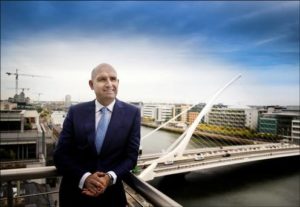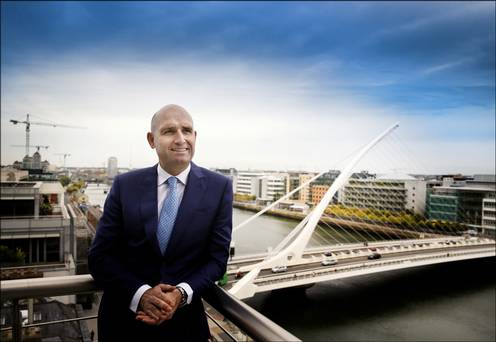'We're now at a crossroads of legal innovation. We can either forge ahead and embrace technology, which is what we're doing, or we can slowl

Barry Devereux is leading his firm into a new high-tech world
‘We’re now at a crossroads of legal innovation. We can either forge ahead and embrace technology, which is what we’re doing, or we can slowly become irrelevant,” says Barry Devereux, who is leading McCann Fitzgerald’s efforts to be at the cutting edge of legal services provision.
Where once a law firm was seen as a place where people came for advice on legal disputes, he wants McCann Fitzgerald to become something of a tech company too.
The firm has just signed a partnership with Neota Logic, an American firm that makes artificial intelligence (AI) software, to explore ways to come up with products that create value for clients.
Devereux wants to grow McCann’s revenue by licensing these kinds of products to clients, and says the firm is already in talks about doing this.
Last year McCann started using artificial intelligence for reviewing large numbers of documents. Devereux says this can be as much as 30pc to 40pc cheaper than the traditional way. It also serves to free up solicitors to spend more time on other tasks.
In one example, the firm reduced 11 million documents that were of potential relevance in a matter down to 11,000 within six weeks. A specialised unit called the Data Investigations Group – where techie types work alongside lawyers – has been set up to manage this process. It started out with discovery, the process whereby the parties to a legal dispute exchange documentary evidence, and has now been expanded to corporate transactions like IPOs, mergers and acquisitions, and loan book sales. The firm has also recently rolled out a service it calls Knowledge Hub where it collates data on particular topics and sends alerts to clients depending on the area they’re interested in.
But just as advances in technology help McCann develop, so too do they bring increased competition.
“We used to compete with other Dublin law firms. We still do. But now our competitors are different and they come from the United States – it might be legal process outsourcing firms like Axiom, and Riverview Law and they’re providing alternate legal services to clients with different models,” says Devereux.
“With the global economic crisis in 2008, that’s accelerated the rate of progress that law firms have had to make because all our clients have faced existential threats to their business and the ‘more for less’ philosophy is now with us. The clients expect more from their suppliers so they can give more to their customers. It’s no different for us, we have to find ways of delivering more for less.”
That raises questions about whether a firm will need fewer solicitors in future. Devereux doesn’t think so.
“Our experience has been that the capacity of the market will grow in line with us demonstrating that we can do things faster. We don’t think there’s a finite pool of work there.
“The firm is growing, and the work for lawyers is less of the day-to-day document review and it’s more tactical and strategic advice, negotiating deals and getting the best deals for clients.”
The company doesn’t disclose details of its financial performance but total employee numbers are up 6pc on last year to 564. Last year, it added 28 new solicitors – more than any other Irish law firm.
Going forward, Devereux’s strategy is to invest resources in the sectors that have high-growth potential. “We have lots of different businesses inside this firm and some are showing exponential growth. So aircraft finance for example has always been a very strong part of our business and is growing fast. The funds area, with over $3trn of funds located in Ireland – that’s a growing area.
“I see fintech as a big area for us. There’s 100,000 people working in technology in Ireland and 40,000 in the financial services industry. When you combine them that’s a lot of smart people doing things that are broadly aligned with each other,” Devereux says.
“The other area of growth is around cybersecurity and privacy. The technology and innovation team here is very engaged in dealing with cyber risk and I suppose the explosion in data creation by the tech companies has been a boon for our team here.”
Asked about buying other law firms, he won’t rule anything out. “We’re always looking for opportunities whether it’s to open an office in the US or make judicious hirings,” Devereux adds.
The Laois native (54) spent many years working on corporate transactions before being elected managing partner nearly three years ago. It was a steep learning curve in the early days, but a challenge that Devereux relished.
“The job of a managing partner is to lead a firm and set a direction for the firm with the partners, and to be crystal clear about where you’re going and how you get there. My job is to create the environment where people want to do their best and encourage them to do that. I learned a lot about people and dynamics and getting the best out of people,” says Devereux, who wanted to take the job because he felt he could make a greater contribution as leader.
Many lawyers come from families with legal backgrounds, but not him. Instead it was the US fictional television series The Paper Chase – tracing the lives of students at Harvard Law School – that made him want to enter the profession.
Becoming a barrister didn’t appeal; helping businesses do deals excited him more than bringing cases to trial and so he became a solicitor, qualifying in the late 1980s. The Irish economy was a mess and so like most of his class Devereux emigrated, in his case to London, where he ended up working for Clifford Chance.
After seven years, he moved to work in the firm’s Singapore office, which helped fuel his love of technology. “Singapore is the size of Laois but yet it moved from being an agrarian society 50 years ago with no natural resources, to becoming a huge trading port and making the most of what they had by investing in R&D and innovation and technology,” says Devereux.
“I see a lot of parallels with Ireland, which is on the western periphery of Europe but now making a lot out of the resources we have.
“If I’m to say why am I so fascinated with technology, some of it has to be traced back to what I could see could be done by that advanced thinking.”
Devereux has his ear close to the ground in the Irish business world and has noticed a number of trends emerging in recent times. One is an increasing acceptance of venture capital and private equity, which is helping businesses grow to a greater scale before selling out to multinationals.
“We’ve acted on many deals where a US or an Israeli company has come in and bought an Irish company for €50m-€100m. Mostly the reason for selling is that the indigenous firm hasn’t the resources to scale up.
“While we’ve made a lot of progress with those businesses and obviously they’ve been clients of ours, it is a source of concern that we are selling out the companies at an earlier stage.”
Another trend Devereux notes that might help with that is the return of the IPO market – led this year by AIB and Greencoat Renewables. A third is the emergence of alternative lenders like Broadhaven or Bluebay.
Change is afoot, too, in the construction sector due to the shortage of completed investment properties.
Institutional investors are now getting involved with projects at the development stage as they search for yield, while an uplift in regulatory investigations from the likes of the Central Bank or the European authorities has also been a boon to the firm.
Inside McCann, the types of people the business is hiring is also evolving. “In the past we would traditionally have hired law students or arts students but now in the last few years we have people whose degrees are in music, technology, engineering and psychology. We’re mixing up the backgrounds because all the studies show and our own experience shows that the more diverse the input, the better the product you have.”
Brexit presents another challenge, with law firms like Pinsent Masons and DLA Piper outlining plans to set up a presence here, while a huge number of solicitors from Freshfields Bruckhaus Deringer have sought entry to the Irish roll of solicitors. Is Devereux concerned about this competition?
“If there’s a migration as there will be of financial services clients coming to Ireland because of Brexit, and we’re seeing a lot of that, it’s to be expected that the big law firms who service those clients out of London won’t simply be happy to pass them over to Irish law firms.
“So I think you will see some judicious hiring by these firms of lawyers in the financial services space. I don’t see them having huge operations but I would imagine they’ll want to have a capability to service those clients in conjunction with us.
“Am I concerned? I would say we’re taking note of what’s happening and our job is to continually ensure that we are providing the best service. Competition brings out the best in you and it’s bringing out the best in us.
“We have to continually come back to reinvent ourselves, which is where technology I think is for us a differentiator. And we feel we’ve made a lot of ground in the last two years.”
Devereux is entering the third year of his four-year term as managing partner and before too long his fellow partners in McCann will pass their judgment on whether his technology drive has been a success.
For now, he just wants to stay on the journey.
independent.ie

